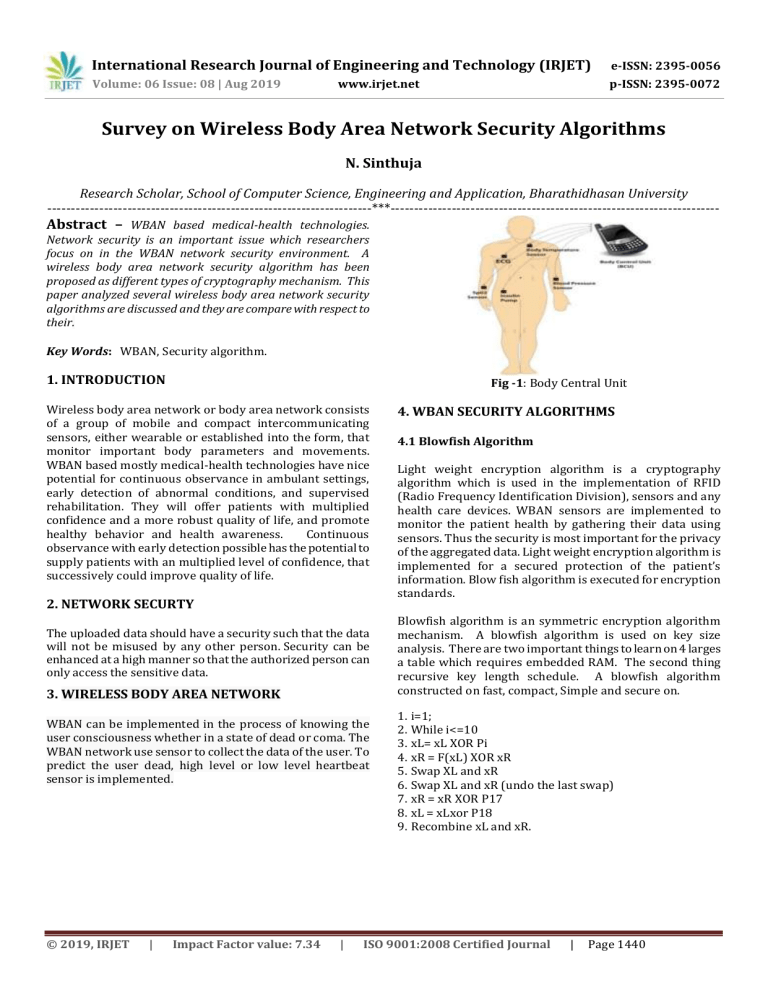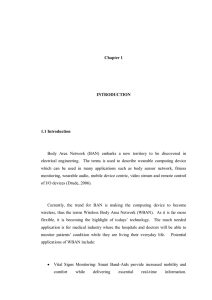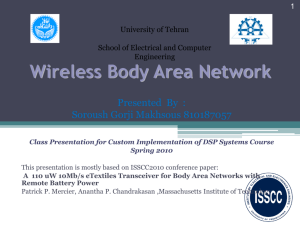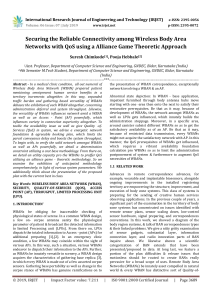IRJET-Survey on Wireless Body Area Network Security Algorithms
advertisement

International Research Journal of Engineering and Technology (IRJET)
e-ISSN: 2395-0056
Volume: 06 Issue: 08 | Aug 2019
p-ISSN: 2395-0072
www.irjet.net
Survey on Wireless Body Area Network Security Algorithms
N. Sinthuja
Research Scholar, School of Computer Science, Engineering and Application, Bharathidhasan University
---------------------------------------------------------------------***----------------------------------------------------------------------
Abstract – WBAN based medical-health technologies.
Network security is an important issue which researchers
focus on in the WBAN network security environment. A
wireless body area network security algorithm has been
proposed as different types of cryptography mechanism. This
paper analyzed several wireless body area network security
algorithms are discussed and they are compare with respect to
their.
Key Words: WBAN, Security algorithm.
1. INTRODUCTION
Fig -1: Body Central Unit
Wireless body area network or body area network consists
of a group of mobile and compact intercommunicating
sensors, either wearable or established into the form, that
monitor important body parameters and movements.
WBAN based mostly medical-health technologies have nice
potential for continuous observance in ambulant settings,
early detection of abnormal conditions, and supervised
rehabilitation. They will offer patients with multiplied
confidence and a more robust quality of life, and promote
healthy behavior and health awareness.
Continuous
observance with early detection possible has the potential to
supply patients with an multiplied level of confidence, that
successively could improve quality of life.
2. NETWORK SECURTY
The uploaded data should have a security such that the data
will not be misused by any other person. Security can be
enhanced at a high manner so that the authorized person can
only access the sensitive data.
3. WIRELESS BODY AREA NETWORK
WBAN can be implemented in the process of knowing the
user consciousness whether in a state of dead or coma. The
WBAN network use sensor to collect the data of the user. To
predict the user dead, high level or low level heartbeat
sensor is implemented.
© 2019, IRJET
|
Impact Factor value: 7.34
|
4. WBAN SECURITY ALGORITHMS
4.1 Blowfish Algorithm
Light weight encryption algorithm is a cryptography
algorithm which is used in the implementation of RFID
(Radio Frequency Identification Division), sensors and any
health care devices. WBAN sensors are implemented to
monitor the patient health by gathering their data using
sensors. Thus the security is most important for the privacy
of the aggregated data. Light weight encryption algorithm is
implemented for a secured protection of the patient’s
information. Blow fish algorithm is executed for encryption
standards.
Blowfish algorithm is an symmetric encryption algorithm
mechanism. A blowfish algorithm is used on key size
analysis. There are two important things to learn on 4 larges
a table which requires embedded RAM. The second thing
recursive key length schedule. A blowfish algorithm
constructed on fast, compact, Simple and secure on.
1. i=1;
2. While i<=10
3. xL= xL XOR Pi
4. xR = F(xL) XOR xR
5. Swap XL and xR
6. Swap XL and xR (undo the last swap)
7. xR = xR XOR P17
8. xL = xLxor P18
9. Recombine xL and xR.
ISO 9001:2008 Certified Journal
|
Page 1440
International Research Journal of Engineering and Technology (IRJET)
e-ISSN: 2395-0056
Volume: 06 Issue: 08 | Aug 2019
p-ISSN: 2395-0072
www.irjet.net
4.2 Light Weight Encryption Algorithm
The algorithm aims to provide efficient and effective
Lightweight Encryption Algorithm in WBAN for e-Health
monitoring. The algorithm will focus only on the
communication. In this algorithm there is proposed design
architecture to secure data transmission from WBAN.A
Lightweight Encryption Algorithm (LEA) is an encrypting
the vital signs of patient.
The light weight encryption algorithm is to provide on
sensor to mobile data transmission using energy efficient
lightweight encryption algorithm in wireless body area
network. They sense the patient data on sensors to vital
signs, heart rate, blood pressure, sugar level, temperature
they have monitored on LEA. The LEA provide on secure to
patient data confidentiality, privacy and integrity. They
encrypted patient data to transmitted to mobile phone or
any other mobile device.
Output: ciphertext C
3. Xi + 1[0] = ROL9(Xi[0] RKi[0]) + (Xi[1] RKi[1])
4. Xi + 1[1]= ROR5(Xi[1] RKi[2]) + (Xi[2] RKi[3])
5. Xi + 1[2] = ROR3(Xi[2] RKi[4]) + (Xi[3] RKi[5])
6. Xi + 1[3] = Xi[0]
7. end for
8. C[0] = X24[0], C[1] = X24[1], C[2] = X24[2], C[3] =
X24[3].
9. return C
Input: random numbers
Output: decrypted t
Step 1: select randomly an integer from 1 to n-1
4.3 Clustered Algorithm
A hybrid cryptography method is implemented in this
algorithm. It’s a dual security method to secure the data. The
hash key encoder algorithm is implemented to protect the
data from the malicious user.
A clustered algorithm is a balanced energy effective and
generated on limited resources efficiently. A clustered
defines on limited energy and sensing range. A avoid the
parallel and short distance communication, a clustered
divided in smaller segments this smaller segments called
clustered. The clustered algorithm is used to collect a patient
health information. A RSA algorithm is here apply for node to
controller identification and verification and SHA is apply
for reliable symmetric message encoding for node to
controller and controller to controller communication. A
security algorithms applied an integrated clustered wireless
body area network to improve communication reliability.
© 2019, IRJET
|
Impact Factor value: 7.34
4.4 ECC algorithm
Medical professionals usually provide live instruction and
feedback to patients to via a telecommunications to save
time and travel cost. A elliptical curve cryptograph
algorithms to provide directed communication between
doctor and patient. They sensors are inserted on patient
body. The patient body temperature are increased a transmit
message of the doctor. The doctor identify message to alert
on alarming situations.
1. X0[0] = P[0], X0[1] = P[1], X0[2] = P[2], X0[3] = P[3].
2. for i = 0 to 23
1. For i=1 to WBANs.Length
/*Process the network*/
{
2. If (WBANs(i).E >EThreshold And
WBANs(i).Prob>Threshold)
/*A node with high energy and high probability is
considered for effective selection of cluster controller*/
{
3. If(Load(WBANs(i)<L EThreshold And
RegionLoad(WBANs(i)) <RThreshold)
/*Check for the capability of node for load balanced
network formation*/
4. Set Controllers.Add(WBANs(i)) /*Set Node As
Controller*/
5. Members=GetMembers(WBANs(i),Coverage) /*Get
Cluster Members*/
6. PerformCommunication(WBANs(i),Members)
/*Perform Cluster adaptive communication*/
}
}
Step 2: generate public key Ky’ = K*P where d = random
number selected between 1 to n-1,P is point on curve and d
is private key.
Step 3: find if point P lies on the curve. If yes proceed
further. If no error process.
Step 4: input data to be send of maximum size 16bytes as
string s.
Step 5: perform add-round key operation on string s Step
bitwise XOR operation is performed
Step 6: perform sub-byte operation on string 16 byte data
should be now converted to 4×4 matrix M
Step 7: perform shift-rows operation on matrix M it the row
is shifted circular right by i columns
Step 8: perform Mix-columns operation on columns of
matrix M. the values of it the column should be added with i
columns
Step 9: perform add-round key operation on matrix M
|
ISO 9001:2008 Certified Journal
|
Page 1441
International Research Journal of Engineering and Technology (IRJET)
e-ISSN: 2395-0056
Volume: 06 Issue: 08 | Aug 2019
p-ISSN: 2395-0072
www.irjet.net
5. ADVANTAGES AND DISADVANTAGES OF
SECURITY IN WIRELESS BODY AREA NETWORKS
Step 10: encrypt data
Step 11: perform inv-shift -rows operation on matrix m
Table -1: Advantages and Disadvantages of security in
WBAN
Step 12: perform sub-byte operation on string s
Step 13: perform add-round key operation on matrix M
Step 14: output final decrypted data
S.
No
1
Algor
ithms
Blowfi
sh
Algori
thm
2
LEA
algori
thm
3
Cluste
red
algori
thms
4
ECC
algori
thms
5
Place
ment
algori
thm
4.5 Positions-Aware BNC Placement Algorithm
(PBP)
Body node arranger (BNC) preparation strategy will
influence the network period eminently. A Blood pressure,
sugar level, heart beat rate, body temperature by using
sensor nodes, placed at different organs of a human body,
and provides an efficient means of communication among
these nodes with the outside world, i.e., a medical centre. A
WBAN connects these freelance nodes by employing a
central controller, referred to as a body node arranger
(BNC).
A Distance-aware BNC Placement Algorithm–Fixed (DBP-F)
is an find out the effective location of BNC with in a WBAN to
enable the system more energy efficient. This algorithm
applicable for routing protocols in BNC. This algorithm used
on many routing protocols, energy efficient adaptive routing
WBAN, semi autonomous adaptive routing WBAN ,
probabilistic energy aware routing protocols are supported
on Distance-aware BNC Placement Algorithm–Fixed (DBP-F)
A Position-aware BNC Placement Algorithm (PBP) is an
exhibits less complex formation. A compared between DBP-I
and DBP-F.a linear computational complexity is an DBP-F.
1. Place a BNC within a WBAN, say the point is P(X,Y).
2. Measure the relative distances (dr1 ,dr2 …. drj) dof all
body nodes (N1, N2.… Nj) from the BNC. Here, ∀𝑁:
Nj∈Uj.
3. ∀𝑁: Nj∈UjUtility
Factor, UF (Nj)
= available energy of node Nj
(dr j)n
4. ∀N: Nj∈Ujufj
= max j:Nj∈UjUF-UF(Nj)
maxj:Nj∈UjUF
5.∀N: Nj∈UjXj
=
ufj
maxj:Nj∈Ujuf
6.∀𝑁: Nj∈Ujreplace
BNC at (Xnew,Ynew) ≡ (ƩNjj=1(xj,xj) ƩNjj=1(xj,yj)
#uj#uj
Advantages
Disadvantages
simple structure
decrease
energy
consumption.
Blow
fish
is
especially
hard
against
attacks
because
of
the
density of the sub
key generation.
Simple structure
Generates some sub
keys in a large
manner
which
provides a higher
security
Hacking is difficult
High scalability
High accuracy
Each user needs unique
key so that the key
generation becomes
complicated.
The key is transmitted
through a unsecured
transmission channel.
Improve
communication
reliability.
Communication is
performed the multi
hop controller to
controller provided
on clustered.
Dual level security.
Elliptic
Curve
Cryptography (ECC),
which
provides
simple, fast and high
cryptographic
strength of data
security.
security for realtime data
transmission in
telemedicine.
Provides
energy
supply in body
nodes.
Energy efficiency
The algorithm should
be light weight to the
memory of the senor
because of the memory
space limitation.
Each user needs unique
key so that the key
generation becomes
complicated
The key is transmitted
through a unsecured
transmission channel
Needs high power
supply and power
demand
Other
networks
security is critical
challenge distributed
and clustered WBAN.
Security flaws (not only
leak
valuable
information
and
degrade the network
life and performance.
ECC encryption system
consumes
more
processing time for
encryption
and
decryption process if
implemented
alone,
which is not preferred
in WBAN.
Does not support
relational database.
Complex for heavy
computation
6. CONCLUSION
This paper briefly describe different type of wireless body
area network security algorithms. This algorithms used to
prevent hackers from stealing patient data. The wireless
© 2019, IRJET
|
Impact Factor value: 7.34
|
ISO 9001:2008 Certified Journal
|
Page 1442
International Research Journal of Engineering and Technology (IRJET)
e-ISSN: 2395-0056
Volume: 06 Issue: 08 | Aug 2019
p-ISSN: 2395-0072
www.irjet.net
body area network security algorithms are classified based
on security metrics and the flow information. These wireless
body area network security algorithms are compared based
on the various performances.
REFERENCES
[1]
[2]
[3]
[4]
[5]
[6]
[7]
[8]
[9]
[10]
Muhammad Sherz Ashamalik, Muhammad Ahamed,
Tahir
Abdullah,
Naila Kousarmehak Nigar
Shumaila “Wireless Body Area Network Security
and Privac. Issue In E-Health Care”, International
Journal Of Advanced Computer Science And
Applications, Vol No: 9, Page No: 209-215, 2018.
Ch Radhika Rani, Lakku Sai Jagan, Ch. Lakshmi
Harika, V.V. Durga Ravali Amara. “Light Weight
Encryption Algorithms For Wireless Body Area
Networks”, International Journal Of Engineering
And Technology, Vol No: 7, Page No: 64-66, 2018.
Azza Zayed Alshamsi, Ezedin Salem Barka,
Mohamed Adel Serhani. “Ligght Weight Encryption
Algorithm In Wireless Bodyarea Network For EHealth Monitoring”. 2016 12th International
Conference On Innovations In Information
Technology (Iit), Page No: 144-150, 2016.
Aarti Sangwan, Partha Pratim Bhattacharya, “A
Hybrid Cryptography And Authentication Based
Security Model For Clustered Wban” Mody
University Of Science And Technology, Laxmangarh,
Rajasthan, Vol No: 2454-7190, Page No:34-54, 2018.
Ritambhara, Alka Gupta, Manjit Jaiswal , “An
Enhanced Aes Algorithm Using Cascding Method On
400 Bits Key Size Used In Enhacing The Safety Of
Next Generation Interet Of Things”. International
Conference On Computing, Communication And
Automation Ieee (Iccca2017), Page No: 422-427,
2017.
Md Tanvir Ishtaique U1 Huque “Body Node
Coordinator Placement Algorithms For Wireless
Body Area Networks” Journal Name (Ieee Internet
Of Things ), Page No:1-9, 2016.
Ming Li and Wenjing Lou, “Data Security And
Privacy In Wireless Body Area
Networks”.
Journal Name (Ieee), Vol No: 1536-1284/10, Page
No: 51-58, 2010.
Muhammad Usman, Muhammad Rizwan Asghar,
Imran Shafique Ansari And Marwa Qaraqu “Security
In Wireless Body Area Networks From In-Body To
Off-Body Communications”.Ieee Access, Vol No: Doi
10.1109/Access 2018.2873825, 2016.
M.Anwar, Ah. Abdullah, R.A. Butt, M.W.Ashraf, K.N.
Qureshi And Fullah
“Securing Data
Communication In Wireless Body Area Networks
Using Digital Signatures”, Ieee Access, Vol No: 23,
Page No: 50-56, 2018.
Sandeep Pirbhul, Heyezhang, Subhas Chandra
Mukhopadhyay, Chunyue Li, Yumei Wang, Guanglin
Li, Wanqing Wu And Yuan Ting Zhang “An Efficient
Biometric-Based Algorithm Using Heart Rate
Variability For Securing Body Sensor Networks”. Vol
No: 15, Page No: 15067-15089, 2015.
© 2019, IRJET
|
Impact Factor value: 7.34
|
ISO 9001:2008 Certified Journal
|
Page 1443



